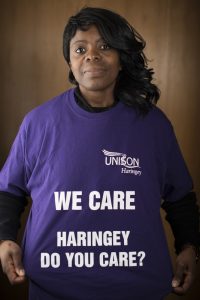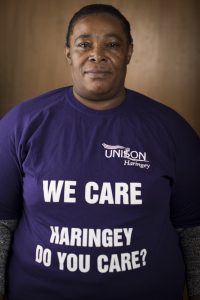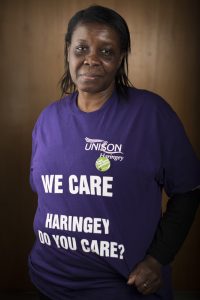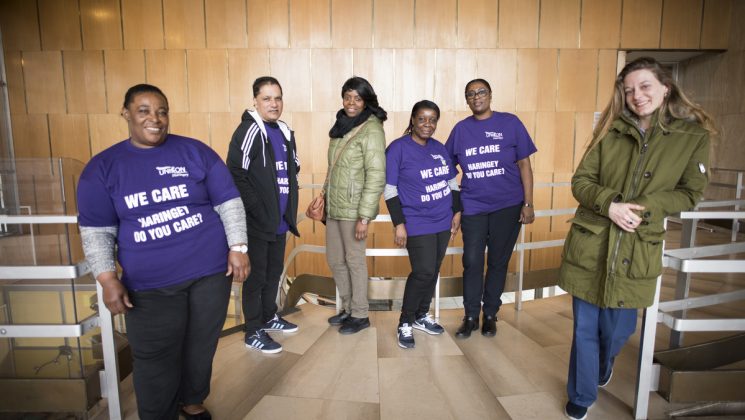“The point is for the future, to make it better. That way hopefully people can get a better level of care.”
Leah Marie Hollis is a homecare worker from Haringey in north London. Along with several colleagues, and with the legal support of UNISON, she is taking her employer to court.
Homecare workers look after the most vulnerable people in our society – the sick, the old, the disabled: the people who often have no one else to look after them.
They are the ones who help vulnerable people get out of bed, wash, dress and eat. They administer medication, change colostomy bags, and sometimes they are the only person a client sees all day.
But instead of being celebrated as the champions they are, these workers are often overloaded with work and paid illegally low wages.
Now, with UNISON’s help and support, one group of homecare workers has had enough. And they’re fighting back.
Their story begins in February 2004, when the company Sevacare signed a contract with Haringey council and took over responsibility for homecare for many of the elderly, disabled and injured people in the borough.
The new company began recruiting staff. According to homecare worker Manoon Jahaly: “They said, ‘We’ll look after you, you can work the hours you want’.” But that’s not what happened.
Homecare workers spend their time travelling from client to client and, legally, they should be paid for that travel time. But the workers in Haringey were not – they were paid only for their time in clients’ homes.
Exposed
In April 2016, The Sunday Times and Channel 4’s Dispatches began a joint investigation into Sevacare in Haringey and sent an undercover reporter to work for the company.
That reporter was paid just £3.89 an hour. At the time the national minimum wage for workers aged over 25 was £7.20.
The reporter also witnessed visits being cut short – something many homecare workers tell UNISON they are forced to do because the schedules set by their employers simply don’t allow them to get to the next client on time.
Another common problem in homecare is the trap of the zero-hours contract.
When workers have no right to a set number of hours’ work each week, they fear speaking up about bad treatment in case their company cuts their hours.
Manoon Jahaly describes it as the company’s trump card. “They can just play their joker and say: ‘We’re going to give you zero hours this week, next week one hour’.”
Despite their zero-hours contracts, last summer the Haringey homecare workers decided they had to do something.
On 19 August, 17 of them launched an employment tribunal claim through UNISON’s legal team against Sevacare and Haringey council, for non-compliance with national minimum wage legislation.
They are claiming the unpaid wages Sevacare owes them.
As word spread about the tribunal claim, more and more homecare workers in Haringey began to come forward and join the case, adding their concerns to the mounting list of allegations against Sevacare.
A national outrage
Unfortunately, this ill treatment of homecare workers isn’t just happening in Haringey.
In 2014, the National Audit Office reported that as many as 220,000 homecare workers up and down the UK could be receiving pay below the national minimum wage. That’s the equivalent of the population of Northampton, one of the largest towns in the UK, being paid illegally low wages to look after society’s most vulnerable people.
The case in Haringey is ongoing. The process was made complicated when Sevacare pulled out of the borough and the workers were transferred to new homecare providers; in keeping with its previous behaviour, the company did not manage the process well.
But the Haringey workers are looking to the future. They have met with many MPs – Kate Osamor, Catherine West, David Lammy, Iain Wright and more – and will continue to raise awareness of the travesties taking place in the care sector.
Says Juliet Henry: “We are highlighting the case, we have the politicians and the people in charge thinking about it.”
And they have a message for other homecare workers who who may follow in their footsteps: stay strong. As Cherry Lyn Williams puts it: “Just be yourself, and know that you can make it.”
Meet the Haringey homecare heroes
Viviane Christelle Mutombo-Cartier

Viviane has two daughters aged 19 and 23. One is a painter and one a make-up artist who has worked at London Fashion Week. She’s originally from France, where her original family still live. When her father recently passed away she spent some time there, but would like to be able to visit her family more often.
That’s not possible because she has been in arrears on her bills since working for Sevacare. She’d also like to do more activities, but can’t afford it. “What I’d love to do is go to the gym and do sport, but it would be a strain.”
Since she left Sevacare, Viviane has moved from a zero-hours to a 16-hour contract and things are improving for her.
“On a zero-hours contract if your client is sent to hospital you don’t have the money that you were getting before. You don’t have the client, you don’t have work, you don’t get paid. It shouldn’t work like that, it’s horrible. How do you get to pay your bills? You can’t function properly.”
Leah Marie Hollis

Leah sings with her clients and loves being a homecare worker because she gets a buzz out of cheering people up.
She wasn’t going to join the court case at first because she felt that no-one went into care for the money. But when she calculated just how little she was being paid she felt angry.
“They’re stealing off the workers and the clients, if you think about it. That’s how I see it, they’re actually stealing.
“These people who are getting millions and driving around in their posh cars. I can’t even afford to get gas and electric.”
She would say to other workers in the same position: “Come forward, don’t be afraid. You are worth something in this world.”
Juliet Henry

Juliet is from the Caribbean and loves cooking Caribbean food.
One of her clients recently died and she hasn’t been given another, which means she is earning even less. But she’s feeling positive because the case is highlighting the problems in the homecare sector.
“We have the politicians and the people in charge thinking about it,” she says proudly.
To other homecare workers in the same position Juliet says: “Don’t let this stop you doing the job you love. If you believe in something, stand up and fight for it.
“Fight for better pay so that you can be paid the living wage.”
Cherry Lyn Williams

When Cherry talks about the people she cares for she smiles broadly and calls them “wonderful, excellent clients.” But she’s worried about one of them.
The company she now works for doesn’t organise shifts adequately, which means this woman isn’t getting the care she needs and she cries through the night.
Cherry feels Sevacare cheated her and her clients. “We do the work, they collect the money. So they should pay us for the work.”
Her message to other homecare workers is: “Stand up for your rights. Go out, join the union, and get help. We can make it. Just be yourself, and know that you can make it.”
Eulalee Harris

Eulalee Harris realised she had a talent for care after she looked after a family member. She has been a professional homecare worker for five and a half years now and loves her job.
At the moment she only has four clients and if one of them dies and her hours are cut she won’t be able to pay her bills.
“I love them all. I tell them I might have to get another job and they say, ‘Oh, I don’t want you to go’. A lot of people think it’s not a great job, but it is. It’s a great job to look after people.”
Eulalee thinks other homecare workers should join UNISON. “A lot of people don’t know how good it is to have somebody to go and talk to, if you need to.”
Manoon Jahaly

Manoon used to be a postal worker but has been working in care for 11 years now.
He thinks the government should address the problem of zero-hours contracts.
“There’s no planning, there’s no budget, because you never know. One week you might be earning £200, next week only about £50. How can you plan?
“There’s no one there guaranteeing you’re going to get work.”
Watch the 15-minute care makeover from hell

